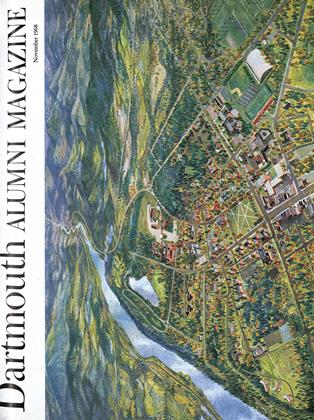NEWLY ACQUIRED as a scholarly resource in Baker Library are the personal papers of the late Grenville Clark, LL.D. '53, distinguished lawyer and citizen statesman, who was the architect of American readiness in two World Wars, a leading defender of civil liberties, and a champion of world peace through world law.
The voluminous collection, characterized by President Dickey as "the legacy of a great American life," filled an entire moving van when transferred from Dublin, N. H., to Hanover last spring. The papers cover all facets of Mr. Clark's long career and range from correspondence with U. S. Presidents to memoranda on local church affairs in Dublin, where he made his home for 25 years prior to his death in January 1967 at the age of 84.
The Grenville Clark papers are currently being inventoried and organized by Mrs. Norman Wight of Dublin, Mr. Clark's secretary since 1951, and Kenneth C. Cramer, College archivist. The collection will be maintained as a unit of major research resources, joining other personal collections recently given to Dartmouth such as those of Augustus St. Gaudens and author Kenneth Roberts.
In presenting Mr. Clark's papers to the College, his children had in mind his special interest in Dartmouth and his friendship with President Dickey growing out of their common concern with civil rights, American foreign policy, and the United Nations. At a May 29 reception and informal ceremony marking the transfer of the collection to Baker Library, members of the Clark family present were Grenville Clark Jr., Boston investment counsel; Grenville Clark's two daughters, Mrs. Mary D. C. Thoron of Rancho Sante Fe, Calif., and Mrs. Duncan M. Spencer of Bedford Village, N. Y.; and Mrs. Grenville Clark Sr.
Grenville Clark, Harvard '03, was the partner of his Harvard Law School classmates Elihu Root Jr. and Francis W. Bird. In World War I he organized the Plattsburg Movement to train civilians as Army officers, as well as a program to train 130,000 Army technicians. As adviser to President Franklin D. Roosevelt in 1933 he helped write the National Economy Act, and in 1940 he drafted and worked for the passage of a peacetime Selective Service Act. It was he who drafted America's declaration of war after Pearl Harbor. In 1944 Mr. Clark retired to his Dublin farm headquarters to devote full time to preventing future wars through enforceable world law. He organized what became known as the Dublin Conference, where many of the world's great figures met to blueprint reforms to strengthen the United Nations' capacity to keep the peace. He was nominated several times for the Nobel Peace Prize. His views were presented in two books, A Plan for Peace (1950) and World Peace Through World Law (1958, 1960, 1966) written with Prof. Louis Sohn of Harvard.
 View Full Issue
View Full Issue
More From This Issue
-
 Feature
FeatureThe Woes of the Hoit Brothers
November 1968 By John Hurd '21 -
 Feature
FeatureTHE VICE VERSA VIRTUES
November 1968 -
 Feature
Feature1953's Triple Alliance
November 1968 By CLIFF JORDAN '45 -
 Feature
FeatureANOTHER COLLEGE YEAR BEGINS
November 1968 -
 Article
ArticleWith the Big Green Teams
November 1968 -
 Class Notes
Class Notes1935
November 1968 By RICHARD K. MONTGOMERY, C. HALL COLTON, THOMAS E. WILSON






